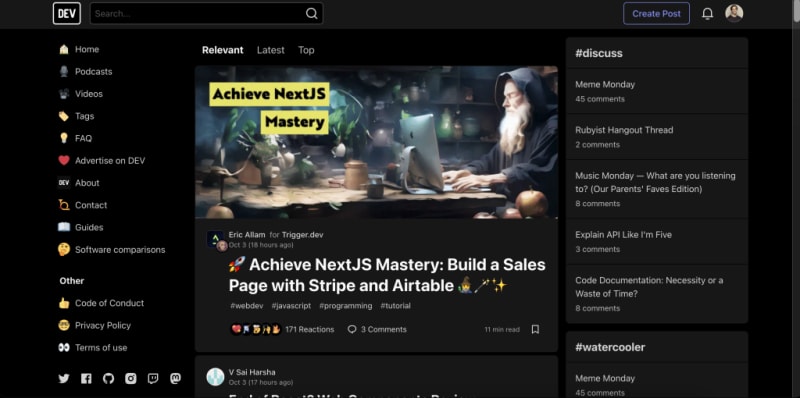Dev.to vs Hashnode: What You Need to Know
 Dominik Keller
Dominik Keller
Developer content platforms play a crucial role in building and nurturing the tech community. They serve as hubs for knowledge sharing, learning, and networking, enabling developers to stay updated and engaged. When comparing Dev.to vs Hashnode, both platforms have garnered significant attention in this space, each offering a distinct set of features and communities.
Origins of Each Platform
Dev.to
Founded in 2016 by Ben Halpern, Dev.to started with the simple idea of creating a space where developers could share knowledge and learn from one another. The platform focuses on building an inclusive community for developers at all levels. Community-driven content and collaboration are at the heart of Dev.to, aiming to create a supportive environment for knowledge sharing and growth.
Hashnode
Hashnode, launched in 2020 by Sandeep Panda and Syed Fazle Rahman, provides a platform for developers to share their expertise, enhance their skills, and connect with like-minded individuals. With a mission to make developer content accessible and discoverable, Hashnode fosters a global community where tech enthusiasts can collaborate and learn. The platform emphasizes content ownership, customization, and SEO, helping developers reach a broader audience and build their online presence.
Which is the Better Community?
In the debate of Dev.to vs Hashnode, the community aspect is pivotal. The heart and soul of any online platform is its community. After all, what's a blogging site without its readers, writers, and discussions? Let's dive into the communities of each.
Dev.to:
Dev.to has a solid mix of in-depth tech tutorials, career advice, and even personal stories of triumph and failure in the tech world. The discussions are as varied as the topics, with a good blend of criticism and appreciation. One of the standout features of Dev.to's community is its emphasis on inclusivity. Whether you're a first-time blogger or someone diving into a new tech stack, the community is ever-ready with encouragement and advice. While Dev.to is predominantly tech-focused, it doesn't shy away from the human aspect of the tech world. Articles about mental health, work-life balance, and personal growth find as much space as the latest in JavaScript or cloud computing.
Hashnode:
There's a laser focus on deep tech content, be it emerging technologies, best practices, or intricate tutorials with Hashnode. The discussions here are deeply technical, making it a haven for those looking to deep dive into specific subjects. While the discussions are predominantly tech-centric, there's lots of general enthusiasm and passion.
Beyond the Obvious Features
When analyzing Dev.to vs Hashnode, it's essential to delve beyond the common features and identify what sets each platform apart.
Dev.to:
1. Drafting with Collaborators: Ever had one of those moments where two (or more) minds are better than one? Dev.to understands this need for collaboration. The platform allows you to work on a single draft with multiple collaborators. Whether you're co-writing a piece or simply seeking feedback before publishing, this feature ensures that your article can be the product of many.
2. Reading List: Unlike the generic 'bookmark' feature we see on most platforms, this one stands out. It not only lets you save articles for later but organizes them in a manner that encourages you to actually come back and read them.
3. Connective Series: Sometimes is hard to find all parts of a series on a blogging platform? Dev.to has a solution for this. Their 'series' feature ensures that all related articles are connected. No more hunting around for Part 2 or 3.

The Dev.to User-Interface
Hashnode:
1. Personal Domain Integration: In the age of personal branding, Hashnode allows for seamless domain integration feature. Bloggers can link their articles directly to their personal domain.
2. Reaction Feedback: While most platforms give you a binary choice of like or dislike, Hashnode offers lots of reactions. This feedback system goes beyond the traditional thumbs up. It allows readers to express their feelings with a bit more specificity, whether they found the article insightful, amusing, or mind-blowing.
3. Publication Opportunity: Every week, writers have a chance to be featured in Hashnode's publications. Think of it as a spotlight moment, where your words have the potential to resonate with a broader audience.

The Hashnode User-Interface
Which Platform Pays More?
Dev.to offers its authors the unique "Sponsorship" feature. This tool allows writers to embed a call-to-action within their posts, inviting potential sponsors to support their work. The beauty of this system lies in its personalized approach. Writers can find sponsors, whether individuals or corporations, that align with their content ethos and are willing to offer financial backing.
What adds to its appeal is the flexibility it provides. As the sponsorship agreements are directly between the author and the sponsor, terms can be customized. This can range from a singular payment for a standout post to consistent sponsorships for a series
Hashnode adopts a distinct approach. Prioritizing a clutter-free reading environment, it sidesteps traditional ads. Instead, it has a system where readers can directly financially support the authors they enjoy - like a digital tip. Hashnode ensures that every cent of the reader's contribution reaches the writer, with no deductions.
However, it's crucial to note that while both platforms present monetization opportunities, actual earnings can be quite variable. Factors influencing this include content quality, engagement level with the audience, the specific niche, and the writer's overall followers. Some might strike gold with lucrative sponsorships on Dev.to due to their content's appeal to particular industries. In contrast, others could see success on Hashnode, backed by a dedicated readership.
Which Platform Gets Your Work Seen?
Another critical aspect in the 'Dev.to vs Hashnode' comparison is the platform's ability to get your work noticed.
Hashnode's standout feature is its domain integration. By allowing writers to publish articles under their domain, Hashnode offers a two-fold advantage. First, it solidifies personal branding. Your content isn't just a part of the broader Hashnode ecosystem; it's showcased under your brand.
Second, and more significantly from an SEO perspective, owning a domain means accumulating domain authority. Every article you publish and every backlink you receive contributes to your domain's strength. Over time, this builds SEO momentum, making it more likely for your content to rank higher in search results.
On the flip side, Dev.to might not offer personal domains, but it compensates with its robust community. The platform is recognized for its active, engaged user base. Every article, when published, doesn't just float into the void. It's actively read, commented upon, and shared by community members. This immediate engagement boosts an article's visibility.
Moreover, Dev.to articles often gain traction on external platforms like Twitter, further amplifying reach. Such social signals are invaluable for SEO. The more an article is shared and discussed, the better it's perceived by search engines. Additionally, Dev.to has an established domain authority, meaning articles on the platform naturally enjoy a degree of SEO advantage.
Balancing Domain and Community
In the Dev.to vs Hashnode debate, a significant consideration is the balance between domain ownership and community engagement. When weighing Hashnode's domain feature against Dev.to's community strength, it's essential to consider your long-term goals. If you're looking to build a personal brand, owning a domain and gradually building its authority might be the way to go. However, if immediate engagement and community feedback are more valuable to you, Dev.to's vibrant ecosystem might be more appealing.
“We create as much information in two days now as we did from the dawn of man through to 2003.”
Eric Schmidt, the former CEO of Google,
Wrapping up Dev.to vs Hashnode
In the end, when deciding between Dev.to vs Hashnode, content creators should consider both the present benefits and the future challenges of each platform.
Challenges loom on the horizon, with concerns about content redundancy and the so-called "Reference Loop from Hell" potentially affecting user engagement for both platforms. As everyone is able to share their thoughts online, many platforms are drowning in a sea of repetitive, low-value, or even misleading posts. This flood of content isn't just annoying for users; it's also a challenge for platforms that want to keep their content quality high. It's becoming harder for the quality content to stand out, and these platforms must discern quality from noise, ensuring quality expression without the clutter.
Subscribe to my newsletter
Read articles from Dominik Keller directly inside your inbox. Subscribe to the newsletter, and don't miss out.
Written by

Dominik Keller
Dominik Keller
Co-Founder of Five, a low-code startup from Brisbane, Australia.

